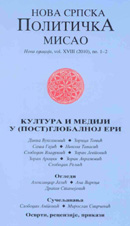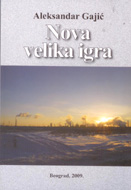| NSPM in English | |||
Why Yanukovych Said No to Europe |
 |
 |
 |
| четвртак, 28. новембар 2013. | |
|
While Russia has not opposed some links between ex-Soviet republics and the European Union, it has opposed the EU Partnership Agreements because these bind the signatories to the EU in such a way as to make membership in the Moscow-sponsored entities (the customs union, the single economic space, and so on) impossible. While such agreements are not an automatic guarantee of future membership in the European Union, they put the country on the trajectory towards harmonizing its institutions with those of the EU member-states and would, over time, significantly reorient the economy away from traditional links with Moscow and towards fuller participation in a wider European market.
Of course, there were two drawbacks for Ukraine in the proffered EU agreements. The first is the requirement for domestic political change—and the expectation that the Ukrainian government would terminate its approach of "selective justice" (highlighting corruption charges only against political opponents of Yanukovych), beginning with a release of imprisoned former prime minister and principal political rival to Yanukovych, Yuliya Tymoshenko. Even the proposal for Tymoshenko to leave Ukraine for medical treatment in Germany, a form of soft exile, was problematic to the Yanukovych team, who continue to see Tymoshenko, whom Yanukovych narrowly beat out to capture the presidency in 2010, as their prime rival. In the short run, keeping Tymoshenko neutralized was more important than signing the EU deal. Like Turkey, which has also had a rocky road with pursuing closer integration with the EU, the Ukrainian government has sought to secure as many economic benefits as possible while preserving as much sovereignty as it can so as not to have to make significant changes to its domestic institutions. Impelled by the desire for greater access to the European market, Ukraine did take a number of steps to bring its institutions into closer conformity with EU standards, but the Rada (parliament) balked this week at passing the last set of bills that would be needed to bring Ukraine into compliance with the EU—including the one concerning Tymoshenko's ability to go abroad for medical care. The second was the announced Russian response. Russia remains Ukraine's largest foreign investor and Ukraine still remains highly dependent on the Russian market. Ukraine's push to secure greater energy independence for itself by developing indigenous oil and natural gas projects will not bear fruit for a number of years, and the country remains dependent on Russia for low-cost supplies of energy. On Friday, Ukraine's prime minister Mykola Azarov bluntly told lawmakers in the Rada that Ukraine could not, at this point, afford an economic rupture with Moscow. "What will be our compensation for the huge losses from losing the Customs Union market, what, I am asking you? Unfortunately, we did not receive a realistic answer to this question."
For the time being, Yanukovych has acceded to Russia's principal demand: to torpedo the EU deal. But Yanukovych has also always resisted Moscow's blandishments and still does not want to see Ukraine fully absorbed into Russia's Eurasian structures, although he has contemplated, in the past, a looser degree of "association" with the emerging Eurasian Union. Nor does he wish to preserve his country's continued dependency on Russia—he still would like closer relations with Europe. In addition, Yanukovych must also deal with unexpected public anger over his decision to suspend the deal. Protests in the capital—attracting more than 100,000 participants—were the largest since the Orange Revolution of 2004 and could easily turn into a major political liability for the government, especially given recent clashes between protestors and riot police. Monday’s statement by European Council President Herman Van Rompuy and European Commission President Jose Manuel Barroso will bolster the position of those who argue that Yanukovych backed down from his own stated commitment to pursue closer ties with Europe in the face of concerted Kremlin pressure: “It is up to Ukraine to freely decide what kind of engagement they seek with the European Union. Ukrainian citizens have shown again these last days that they fully understand and embrace the historic nature of the European association.”
Yanukovych's preferred outcome would be to put real limits on any continued economic and political integration with Moscow—while seeking an accommodation with the EU that would help Ukraine's economy but not challenge his political dominance of the country. When he meets with European leaders in Vilnius later this week, he will have an opportunity to sound out what he might be able to salvage from the wreckage of the deal. He would prefer to continue his precarious balancing act between East and West rather than find himself fully under Moscow's thumb or answering to EU directives. The question now is whether either Putin or Brussels is willing to accommodate him. Nikolas K. Gvosdev, a contributing editor atThe National Interest, is a professor of national-security studies at the U.S. Naval War College. |
Остали чланци у рубрици
- Playing With Fire in Ukraine
- Kosovo as a res extra commercium and the alchemy of colonization
- The Balkans XX years after NATO aggression: the case of the Republic of Srpska – past, present and future
- Из архиве - Remarks Before the Foreign Affairs Committee of the European Parliament
- Dysfunction in the Balkans - Can the Post-Yugoslav Settlement Survive?
- Serbia’s latest would-be savior is a modernizer, a strongman - or both
- Why the Ukraine Crisis Is the West’s Fault
- The Ghosts of World War I Circle over Ukraine
- Nato's action plan in Ukraine is right out of Dr Strangelove
- Bosnia and Syria: Intervention Then and Now

.jpg)








 Christopher Marsh and I, in our recently published book (Russian Foreign Policy: Interests, Vectors and Sectors), sketch out what we term "Putin's Eurasian dream"—the ambition to create a Eurasian economic and political zone where Moscow sets the overall agenda and is able to hold its own in the global geopolitical competition with the United States, the EU and China—and to have the foundations laid by 2015. A major obstacle to this vision was abruptly removed on Thursday when Ukrainian president Viktor Yanukovych announced that his country would not sign a landmark partnership agreement with the European Union—which Russia had consistently opposed. The Deep and Comprehensive Free Trade Agreement, which was to be concluded at the EU "Eastern Partnership" summit in Vilnius this coming week, was seen as the linchpin of a renewed EU commitment to engage with the states of the former Soviet Union. While Georgia and Moldova will still ink their own initial trade agreements with Europe, it has cast a pall over the Eastern Partnership process, because, as Steven Blockmans of the Centre for European Policy Studies notes, "The whole idea essentially falls apart without Ukraine."
Christopher Marsh and I, in our recently published book (Russian Foreign Policy: Interests, Vectors and Sectors), sketch out what we term "Putin's Eurasian dream"—the ambition to create a Eurasian economic and political zone where Moscow sets the overall agenda and is able to hold its own in the global geopolitical competition with the United States, the EU and China—and to have the foundations laid by 2015. A major obstacle to this vision was abruptly removed on Thursday when Ukrainian president Viktor Yanukovych announced that his country would not sign a landmark partnership agreement with the European Union—which Russia had consistently opposed. The Deep and Comprehensive Free Trade Agreement, which was to be concluded at the EU "Eastern Partnership" summit in Vilnius this coming week, was seen as the linchpin of a renewed EU commitment to engage with the states of the former Soviet Union. While Georgia and Moldova will still ink their own initial trade agreements with Europe, it has cast a pall over the Eastern Partnership process, because, as Steven Blockmans of the Centre for European Policy Studies notes, "The whole idea essentially falls apart without Ukraine."
 Ukraine's decision does represent a major setback for Western policy. It again exposes the hollowness of former secretary of state Hillary Clinton's promises at the end of 2012 that the United States would undertake a major effort to counter Putin's Eurasian integration plans; the United States continues to rhetorically oppose Moscow's proposals but is not going to devote much time, energy, and most crucially, resources to the task. It also challenges the EU approach which believed that Moscow would have no choice but to acquiesce to greater EU activism in the Eurasian space, and that Brussels could present Russia with a fait accompli. Ulrich Speck, a visiting fellow at Carnegie Europe, summed up the naivete of this approach: "The EU always saw itself as someone that wasn't in to playing geopolitical games. But the irony is that Putin's new assertiveness forced the EU into playing power politics, so this has become largely a geopolitical game."
Ukraine's decision does represent a major setback for Western policy. It again exposes the hollowness of former secretary of state Hillary Clinton's promises at the end of 2012 that the United States would undertake a major effort to counter Putin's Eurasian integration plans; the United States continues to rhetorically oppose Moscow's proposals but is not going to devote much time, energy, and most crucially, resources to the task. It also challenges the EU approach which believed that Moscow would have no choice but to acquiesce to greater EU activism in the Eurasian space, and that Brussels could present Russia with a fait accompli. Ulrich Speck, a visiting fellow at Carnegie Europe, summed up the naivete of this approach: "The EU always saw itself as someone that wasn't in to playing geopolitical games. But the irony is that Putin's new assertiveness forced the EU into playing power politics, so this has become largely a geopolitical game."













